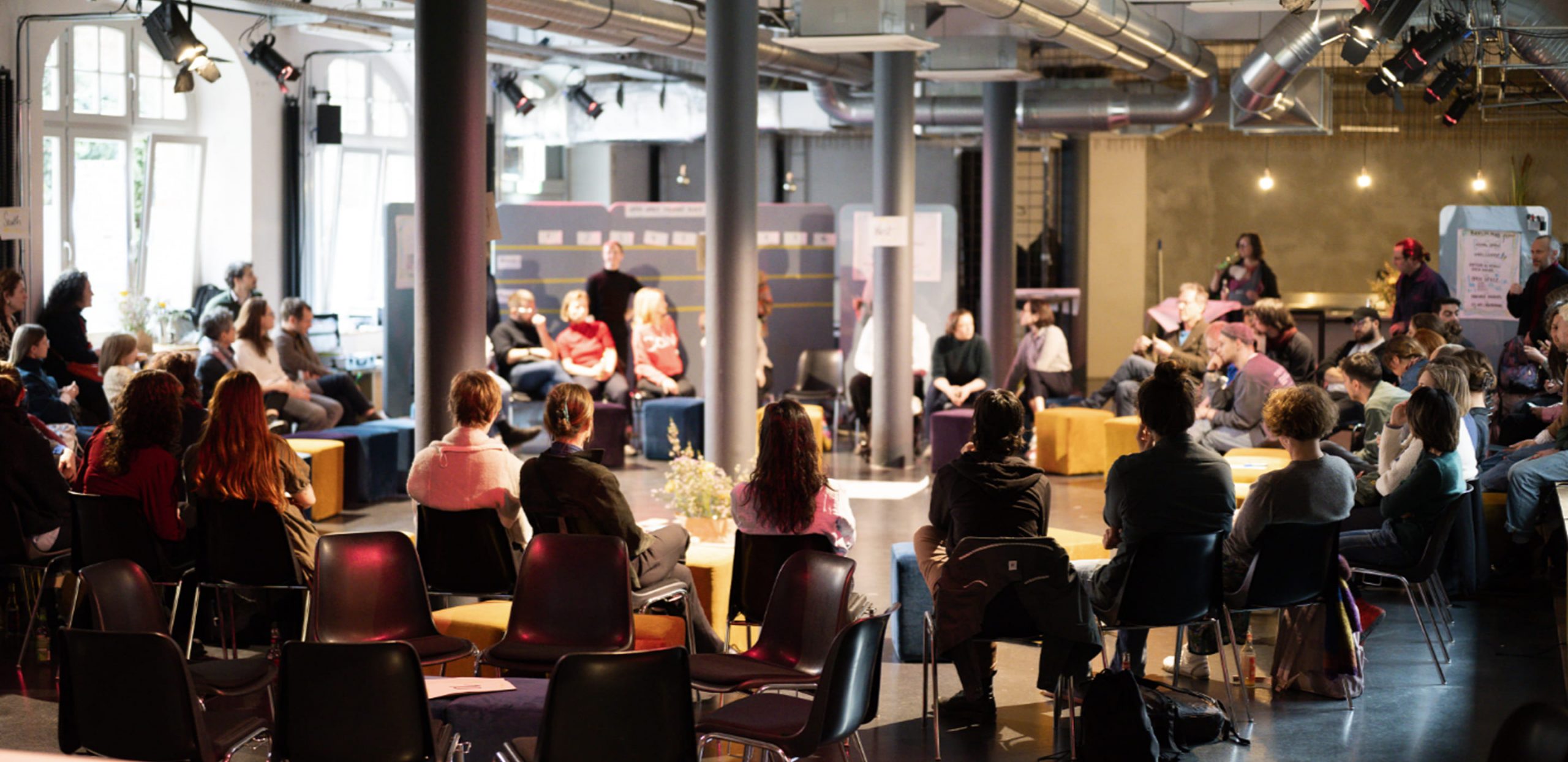Facilitating Dialogue in Times of Rupture
A three-day in-person course for civil society practitioners
This course by the Civil Society Forum’s Berlin Hub initiative is an invitation to reimagine facilitation as a practice of belonging, where differences don’t divide us but instead open space for authentic transformation.

Schedule/
Registration

This course is for civil society actors—activists, organizers, artists, journalists, educators, community leaders, neighborhood and land defenders—who are on the frontlines of the overlapping crises of our times.
Dates
16–18 October 2025
10:00–18:30 each day
OFFLINE

Because staying human together
is the work
of now
Context
We are living through a time of immense rupture.
Imperial wars, forced displacement and authoritarianism are on the rise worldwide. Trans and queer communities face growing attacks on their safety, dignity and belonging. At the same time, climate collapse, inequality and systemic violence deepen the wounds of imperialism and colonialism.
Everywhere, as the fractures of injustice widen and our pain deepens, those organising against these atrocities are finding it harder than ever to stick together. In this era of mass disconnection, the ability to organise across our differences is becoming one of the most urgent skills of our time.
Civil society actors — activists, organizers, artists, journalists, educators, community leaders, neighborhood and land defenders — are on the frontlines of these overlapping crises. We are asked to co-create spaces of participation, healing and dialogue. But too often, our efforts lead to severing and fragmentation, rather than connection and coalition-building. We find ourselves in rooms where silence and fear dominate, where pain overwhelms and where the risk of othering feels dangerously high.
Facilitation — the role of guiding groups through conversation, conflict, collaboration and collective transformation — can offer our movements so much more than crisis management. It can bring ease as we approach the most difficult conversations of our time. It can make room for lightness without denying pain, for connection without demanding resolution. When practiced with courage, care and consistency, facilitation can go beyond a mere toolbox for dialogue. It can serve to shift the norms of how we share space and resources, collaborate to address shared challenges and relate to each other and to our world — helping us to foster joy, cultivate solidarity and grow collective resilience.
This course is an urgent invitation to rethink how we hold space, how we gather and how we care for one another in this era of collapse and courage.
Now is the time to:
Reimagine facilitation as a radical relational practice
— one that embraces and harnesses the power of our grief, rage, and even anxiety.
Learn to be with both pain and tension without shutting down,
and to move through conflict without treating each other as disposable.
Hold space not just for dialogue, but for dignity and belonging
— learning and growing as we go, while still showing up authentically.
This is not a neutral space.
This is a space for those who refuse to look away. For those who understand that silence is not safety, and that neutrality — in the face of violence, oppression, and erasure — is complicity.
We don’t gather to smooth over tension or pretend pain isn’t in the room. We gather to face ourselves and each other in our wholeness — fully, honestly and together.
In this context, the call to facilitate is not just about learning and repeating a set of tools and techniques. It is an act of courage and radical imagination. It is resisting our fragmentation. It is how we create spaces for naming truths, holding contradictions, and honoring our shared dignity — even and especially while everything around us seems to be breaking.
Because staying human together is the work of now.
What we
will learn?
Through an experiential, participatory and conversation-based learning format, we will explore together:
Deep listening and witnessing
Power and group dynamics
Setting spaces for connection
Potential of stories and storytelling
Conscious communication
Trauma-informed practices for (co-)regulation
Tending to disagreement, hurt, harm and conflict
Harvesting collective intelligence
Foundations of learning and session design
Building community and connection beyond collaboration
Methodologies and Inspirations Include:
Art of Hosting, Theatre of the Oppressed, Work That Reconnects, Holding Change, Politics of Trauma, Resilience Toolkit, and more.
We will work with design tools such as:
4-Fold Practice, Pain Protocol, Harm Ladder, Stepping Stones of Design, and the Diverge/Converge Diamond Model.
Who is this for?
This course is for those working in and around civil society—organisers, facilitators, educators, movement builders, community workers, artists, activists, journalists, land and neighborhood defenders—who refuse to look away.
It is not a neutral space. It is for those who understand that neutrality in the face of violence is complicity. It is for those seeking to build collective resilience, dignity and care in the midst of collapse.
Pricing
We offer solidarity-based pricing to reflect different capacities and roles.
We will prioritize financial accessibility for those most impacted by systemic violence.
Community Price / 90 EUR
[03]
NGOs / Non-Profit Sector / 590 EUR
[02]
Reduced Price / 350 EUR
Corporate / Solidarity Tier / 1180 EUR
Facilitators (Hosts)
Sarj Lynch
Sarj Lynch (they/them) is a Berlin-based facilitator, participation designer and community care organiser with a lot of curiosity. They are interested in dreaming new realities and practicing utopias with people who care. They are a co-initiator of aequa (2018), the aequa Workshops Collective (2020), and Berlin Collective Action e.V. (2020). They are also a resident of Refuge Worldwide, hosting the monthly aequa Radio show. Growing up as the oldest kid of five in a single-parent household, their role as a teacher started from age three, and their work in community organising started around age eight.
aequa
aequa is a community for social equity, solidarity and mutual support — an intersectional network of people and projects brought together by our shared vision of a world in which everyone can thrive. Together, we explore hope as a practice, becoming more capable together and growing our collective power in the process.
Alice Priori
Alice Priori, activist, community and process facilitator, Art of Hosting practitioner, and dancer. She is passionate about creating experiential learning formats that center relationality, embodiment, and decolonial thinking to nourish new radical imaginations and cultures of care. Alice is the co-founder and coordinator of the CitizensLab e.V.
CitizensLab E.V.
CitizensLab e.V. is a Berlin-based NGO action-researching how to bring a regenerative approach into the field of social justice, societal transformation, and citizen engagement, integrating the cognitive, the emotional and the physical body as we seek to rewrite current narratives of democracy
Rafia Shahnaz
Rafia Shahnaz is a queer migrant of color from Pakistan, and their own healing journey through migration, systemic oppression and trauma shapes the way they hold space. For over eight years, they have facilitated psychosocial support in diverse communities, weaving lived experience with training in Compassionate Inquiry, Art Therapy, Somatic & Embodiment practices, Psychedelic Integration Therapy and Gestalt Therapy. Grounded in Sufi and Buddhist traditions, their facilitation centers care, depth and radical honesty — creating spaces where transformation, connection and self-awareness can unfold.
arjunraj
arjunraj is a filmmaker, multi-modal researcher, artist and pedagogue currently working as a Research Associate at University of Hamburg, Germany. Drawing from a decade of experience in telling stories, collaborating with individuals, carrying stresses of othering, arjunraj has been developing a revolutionary collaborative storytelling methodology. arjunraj has taught this methodology across Europe, Tanzania and India. arjunraj is a recipient of fellowships from Bosch Stiftung, Berlin Senat & CIRCE, U Institut. arjunraj’s long-term goal is to enable the study and practice of storytelling in order to open up new possibilities for imagining more plural ways of seeing—and of being seen.
PROGRAMME
Daily Schedule:
Arrival: 9:30–10:00
Start: 10:00
Lunch: 13:15–14:15
Close: 18:30
Day 1: Grounding: Anchoring in Stories and Perspectives
How can listening to and witnessing each other’s stories help us harvest meaning, and how our perspectives, privileges, and roles shape the spaces we host?
Morning Practice: Practice in deep listening, witnessing and sharing
Afternoon: Guest Trainer Arjunraj — “Körperkino” Collective Storytelling Workshop
Day 2: Planting: Nourishing Relational Spaces
How can knowledge of our bodies and somatic practices inform how we respond to facilitation challenges, and design relational spaces for collective care, creativity and cohesion?
Morning: Guest Somatic Practitioner (TBC) — Embodied practices for co-regulation and trauma-informed facilitation
Afternoon: Framework for designing radical relational spaces
Day 3: Cultivating: Tending to the (Un)expected
How can we practice repair and restoration instead of punishment and isolation when harm happens, and chart a path from where we are now to the collective futures we envision?
Morning: Protocol for when harm happens, Guest Speaker: Samira Iraki with case study on bridging great divides
Afternoon: Integrate learnings and bring forward knowledge and practices into our own contexts
Other events
20 January 2026 10.00-11.30 CET
When Gender Becomes a Target: Discussion on the anti-gender shift in Europe (online event)
Across Europe, we are witnessing a coordinated rise in anti-gender politics, from legislative restrictions to public campaigns targeting gender equality and LGBTQ+ rights.
Governments and far-right groups in Italy, Poland, Hungary and some other EU countries challenge gender equality and LGBTQ+ rights by framing them as “ideology.” In Eastern Europe and Central Asia, the situation is often even more severe, with “LGBT propaganda” laws and continuous pressure on civil society.
These trends don’t stop at national borders. They spread through shared messages, partnerships and funding, affecting communities across the region.
On January 20, 10 AM CET, we invite you to join the discussion, where we will take a closer look at the anti-gender shift through the findings of a Policy Paper created by Quarteera with the CSF and the CSF Working Group on Gender Equality.
Quarteera (Germany) will share findings from the policy paper, and speakers from Italy (Certi Diritti), Georgia and Russia (ComingOut Initiative) will share their perspectives and how local civil societies are resisting the anti-gender turn.
Discussion will be held in English. Register for the discussion HERE.